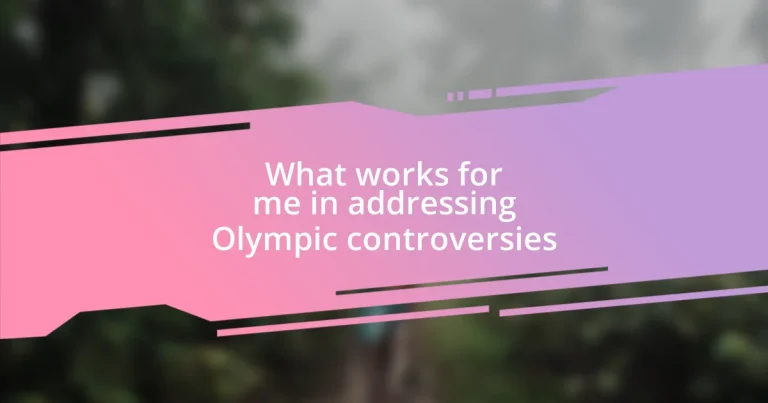Key takeaways:
- Olympic controversies often stem from conflicts between national pride and global ideals, highlighting issues like athlete safety, funding, and environmental impact.
- Listening to diverse perspectives from athletes and local communities fosters empathy and enriches the discourse surrounding Olympic events.
- Developing fair solutions and engaging stakeholders through open communication is crucial for creating inclusive policies that accurately reflect the needs of all parties involved.
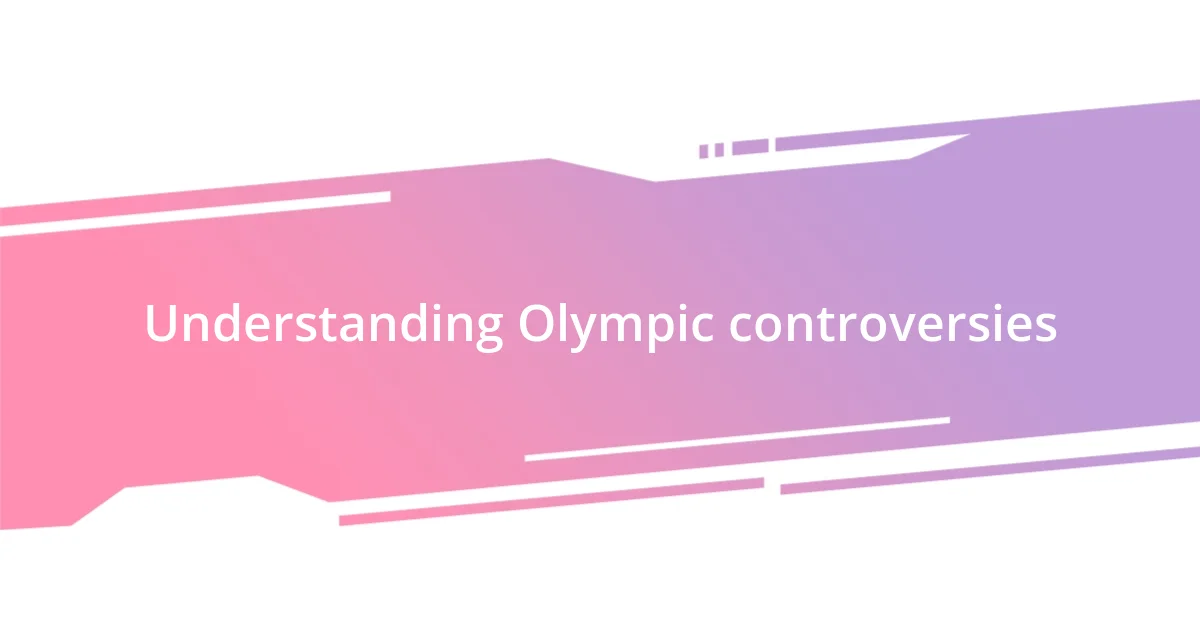
Understanding Olympic controversies
Olympic controversies often arise from a mix of politics, ethics, and human behavior, painting a complex picture of the Games. I remember watching the 2008 Beijing Olympics, transfixed not just by the athletic prowess but by the criticisms surrounding the event – from human rights issues to environmental concerns. It made me wonder, how far can we go in celebrating sports while overlooking the underlying dilemmas?
Many controversies are sparked by the clash between national pride and global ideals. For instance, the 2016 Rio Games faced backlash over economic disparities and public health crises. This raises a profound question: should the thrill of competition overshadow the realities faced by the host nation? Reflecting on this, I realized that understanding these tensions is essential for a more holistic view of the Olympics.
Moreover, as I investigate Olympic scandals, I can’t help but feel a twinge of disappointment. Scandals like doping or corruption erode the spirit of fair play that the Olympics should embody. Isn’t it ironic that these beautiful athletic displays can simultaneously unveil such dark facets of human nature? It’s crucial to navigate this murky water thoughtfully, emphasizing transparency and accountability.
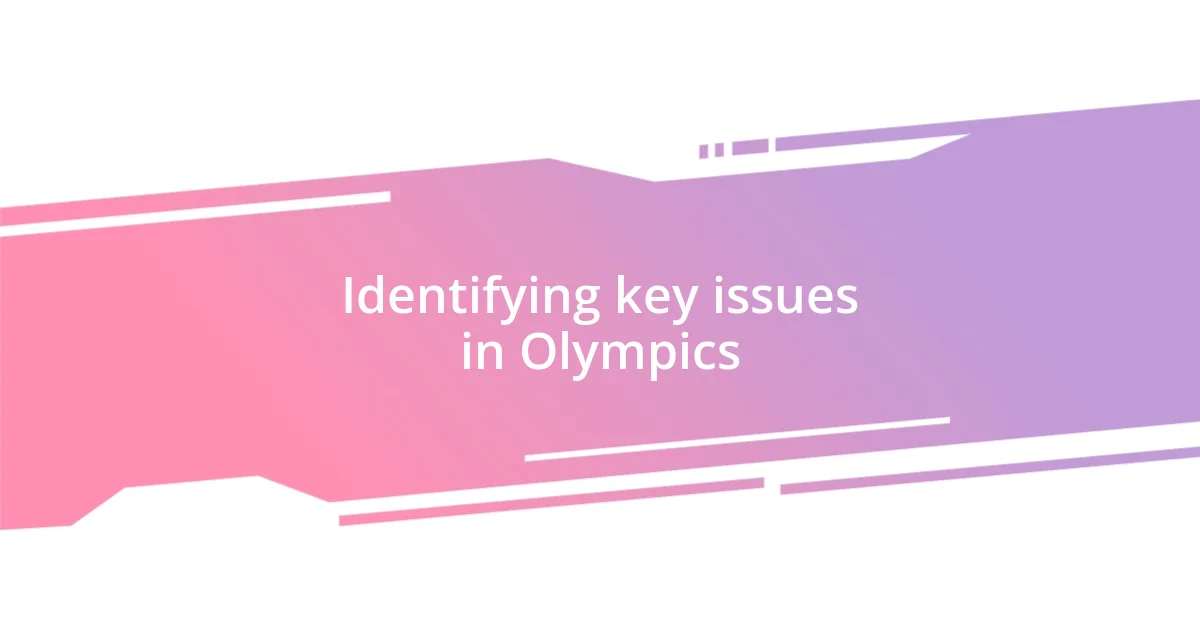
Identifying key issues in Olympics
Identifying key issues in the Olympics involves peeling back the layers of the intricate web of controversies that plague the Games. One crucial issue is the persistent concern over athlete safety, both physically and mentally. I recall a time during the 2016 Rio Olympics when I was struck by the stories of athletes dealing with immense pressure and the mental health challenges they faced. It made me think, how can we support our athletes if we don’t first address their well-being?
Another significant area of contention arises from funding and sponsorship. I once chatted with a former Olympic athlete who shared insights about how financial support often comes with strings attached. This reality leads to a crucial question: Should corporate interests dictate the values of an event that’s supposed to represent pure athleticism? It’s a heavy burden for the athletes who find themselves navigating the values imposed by sponsors, and it’s something that deserves our attention.
Lastly, there’s a substantial debate surrounding the Olympics’ environmental impact. With each Games, there’s an underlying tension about whether the excitement justifies the ecological cost. I remember reading about the 2020 Tokyo Olympics and how host cities strive to balance infrastructure development with sustainability. This raises a salient issue about the legacy each Olympics leaves behind. Are we sacrificing the planet for the love of sport? These issues suggest that while we cheer for champions, we must also hold space for the environmental narrative.
| Key Issue | Significance |
|---|---|
| Athlete Safety | Focus on mental and physical well-being to enhance performance. |
| Funding and Sponsorship | Corporate influences can shift the core values of the Olympics. |
| Environmental Impact | Assess the ecological footprints left by the Games. |
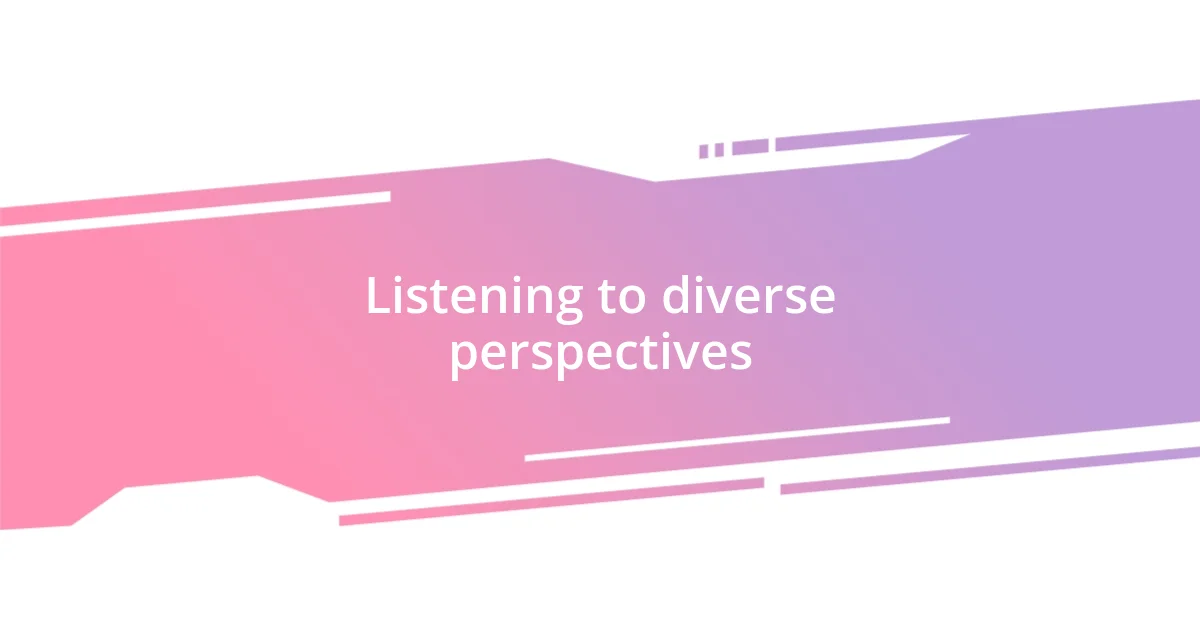
Listening to diverse perspectives
It’s fascinating how listening to diverse perspectives can transform our understanding of Olympic controversies. I can recall a conversation with a friend who hails from a country that hosted the Olympics. She shared her mixed feelings about the pride she felt for her nation, juxtaposed with the concerns over the economic burden the Games brought. This personal insight made me realize that every controversy isn’t just a headline; it’s intertwined with people’s lives and beliefs. Engaging with these varied viewpoints enriches the discourse and encourages empathy, making us more informed advocates for change.
- Seeking out voices from different communities helps highlight unique concerns.
- Engaging with athletes allows us to hear firsthand the impacts of decisions made at the administrative level.
- Conversations with local residents reveal the often overlooked social dynamics at play during the Games.
- Understanding cultural backgrounds fosters a more comprehensive discussion around national pride and representation.
Listening actively to these perspectives not only broadens our understanding but can turn out to be a powerful catalyst for change. The more we listen, the more we can appreciate the complexities that surround the Olympic spirit.
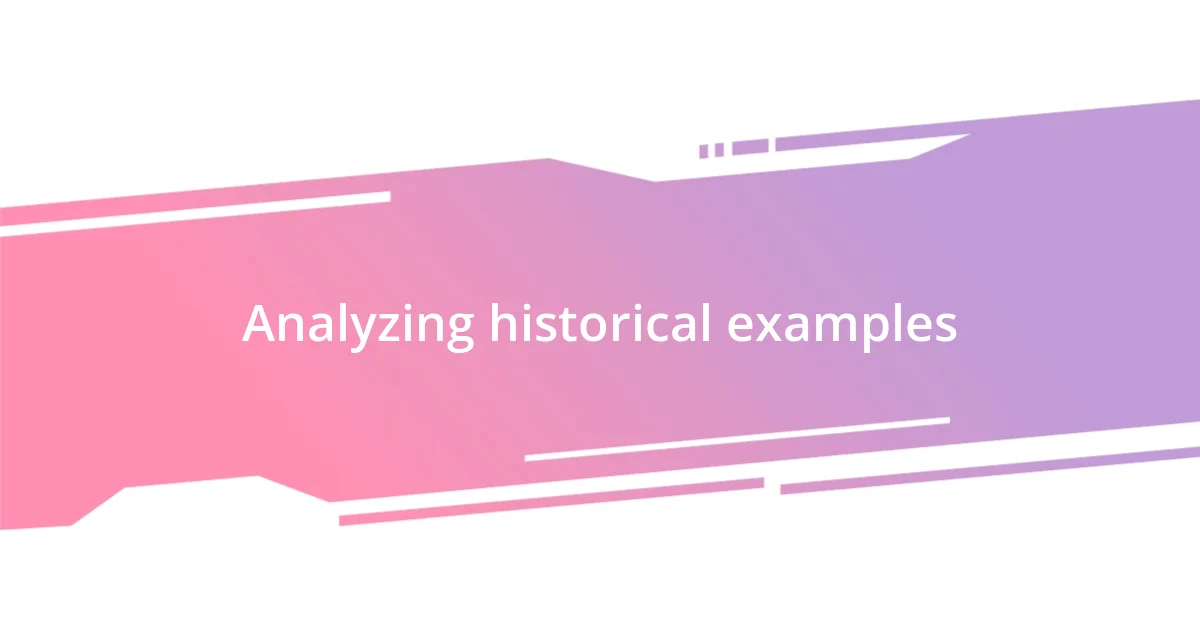
Analyzing historical examples
Analyzing historical examples can provide valuable insights into how Olympic controversies have been addressed or exacerbated over time. Take the 1972 Munich Olympics, for instance. The tragic events that unfolded during this event profoundly affected the world’s perception of athlete safety. Reflecting on the aftermath, I often wonder: how could a sense of security have been better prioritized for the athletes and attendees? This moment in history has since pushed the Olympic Committee to sharpen their focus on safety protocols, yet the lingering impact still resonates.
Another compelling historical case is the 1980 Moscow Olympics, where political tensions led to a significant boycott by numerous countries. This action was a stark reminder of how geopolitical issues can overshadow the pure essence of sportsmanship. I can recall a discussion with a colleague who competed that year; he described the heartache of athletes whose dreams were deferred due to politics. It’s a poignant illustration of the sacrifices made by individuals caught in wider conflicts, highlighting the intersections of sports and global relations.
Lastly, the 1996 Atlanta Olympics illustrated how an event could serve as a cultural touchstone amidst adversity, particularly when considering the bombing that occurred. I still feel the weight of resilience exhibited by athletes and spectators alike during that tragic time. It makes me think about the power of sports for healing—can these moments of unity in the face of tragedy redefine how we perceive Olympic history? These historical examples serve as reminders that behind every controversy lies a human story, calling us to delve deeper into the emotional narratives at play.
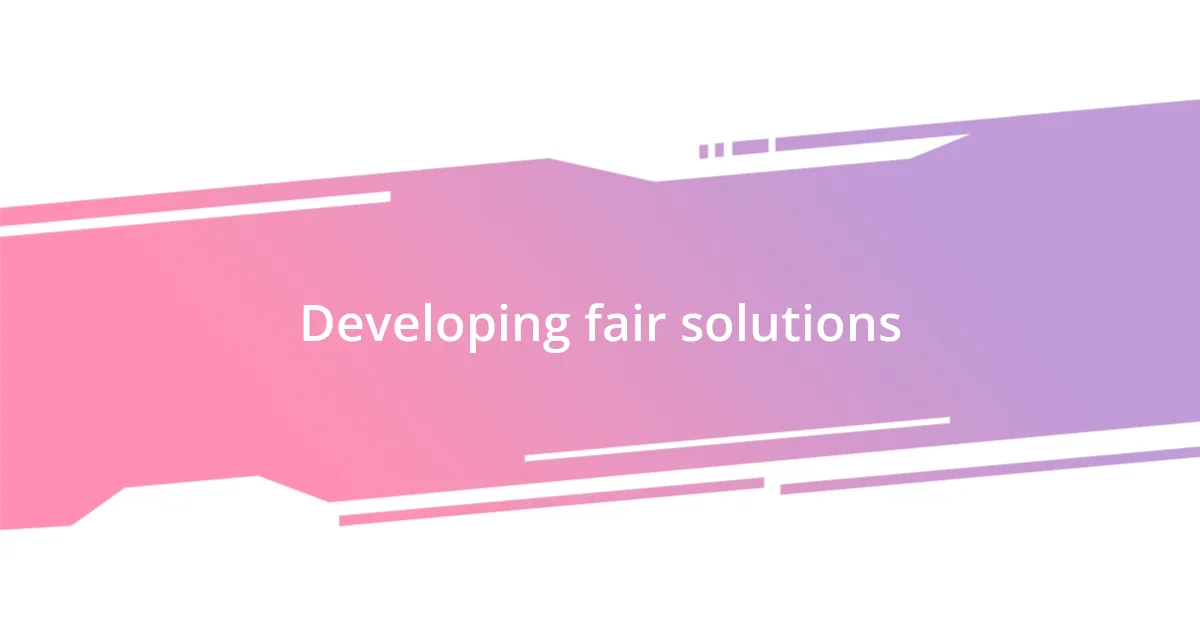
Developing fair solutions
Developing fair solutions requires a genuine commitment to inclusivity. I remember discussing this with a small group of friends while watching the Olympics, and we brainstormed ways to ensure every athlete’s voice is heard. It struck me that implementing advisory panels made up of athletes, coaches, and community members could lead to more balanced decision-making. How often do we see policies introduced without the direct input of those most impacted?
Collaboration can bring forth creative solutions that might not arise in a typical boardroom setting. For example, I once attended a local sports event where organizers invited not just the elite athletes, but also amateur participants to share their viewpoints on accessibility issues. Their feedback was both insightful and eye-opening. I realized then how often we overlook the importance of making competition fair for everyone.
It’s crucial to recognize that fairness isn’t a one-size-fits-all concept. What works for one athlete or community may not apply universally. I encountered this firsthand when volunteering at a youth sports clinic; different backgrounds shaped diverse expectations from the Olympic experience. I found myself wondering: how can we tailor solutions to cater to individual needs while still upholding the spirit of the Games? The answers lie in empathetic dialogue and an unwavering willingness to adapt.
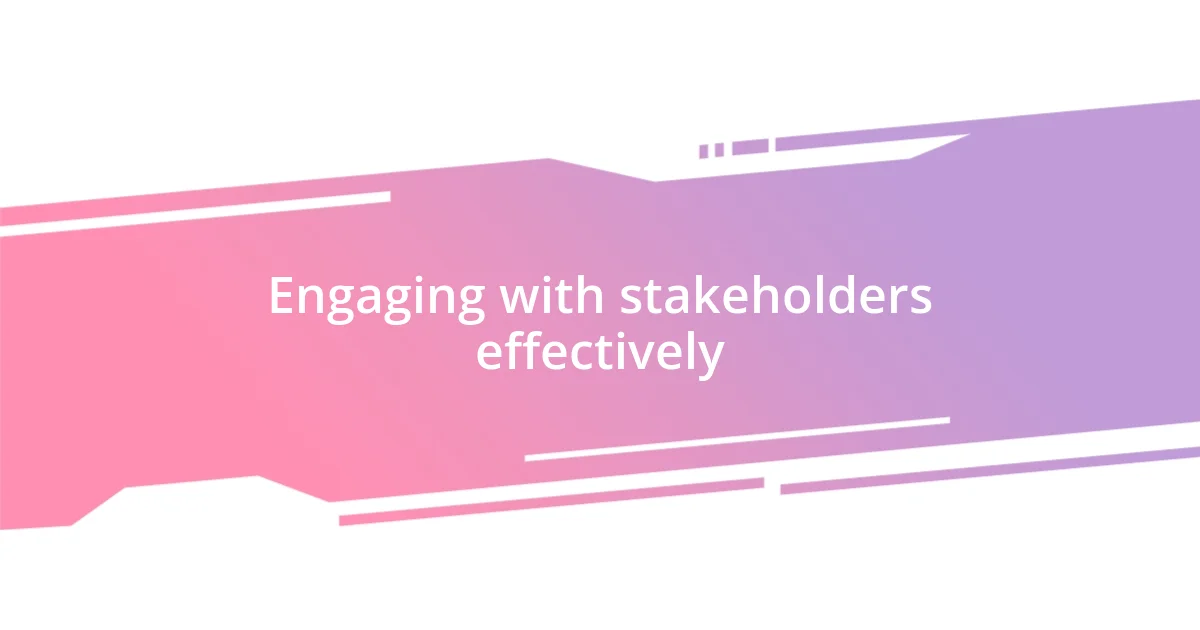
Engaging with stakeholders effectively
Engaging with stakeholders effectively is all about building trust and open communication. I remember once attending a forum for local athletes where we discussed the impact of media portrayal on our sporting events. The stories shared were often filled with frustration and hope, highlighting how vital it is to hear from those in the trenches. It hit me then—how can we expect meaningful change if we don’t foster an environment where these voices are uplifted?
I’ve also learned that listening without the intention to respond is a powerful skill. During a community outreach event, I facilitated a dialogue between athletes and organizers over dinner. So many athletes openly shared their experiences, and as I listened, I sensed a common thread of yearning for connection and understanding. It made me question: how often do we genuinely engage before we act?
When addressing Olympic controversies, collaboration is key to ensuring all stakeholders feel valued. I experienced this firsthand while helping a friend organize a local tournament. By inviting parents, coaches, and even local businesses into the conversation, we could shape an event that resonated with the entire community. It reinforced my belief that when diverse perspectives come together, we not only capture the essence of inclusivity but also create a more substantial impact that resonates well beyond the event itself.
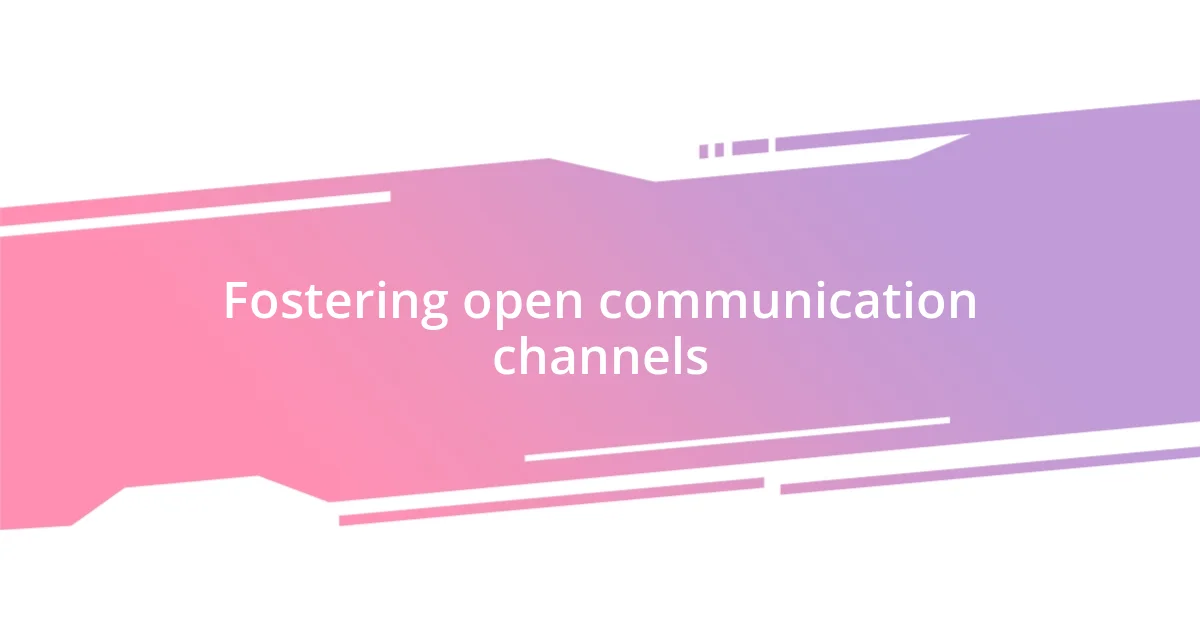
Fostering open communication channels
Fostering open communication channels is fundamental to addressing Olympic controversies. I vividly recall a conversation with a fellow coach during a training camp. We discussed how often athletes shy away from expressing their concerns for fear of repercussions. I asked myself, how can we create a space where honest dialogue thrives? This prompted us to implement regular check-ins, allowing athletes to voice their thoughts in a safe environment. It’s astonishing how simply giving them the floor can lead to impactful changes.
In another instance, I participated in a roundtable discussion with representatives from various sports. Each individual brought unique experiences and perspectives, highlighting the complex layers of communication that exist in the Olympic space. It struck me that active listening fosters a deeper understanding of issues that may otherwise remain unspoken. I often think about how we can translate these discussions into concrete steps that resonate beyond just words.
These experiences have taught me that fostering open communication isn’t just about talking; it’s about creating genuine connections. I remember being part of a community workshop where we mapped out feedback channels for athletes. As we shared our ideas, I could feel the energy shift; it was as if we were building a bridge that connected our aspirations. It made me wonder: how can we sustain such connections in a way that continues to nurture dialog even after controversies arise? Building that foundation is essential for long-lasting change.












